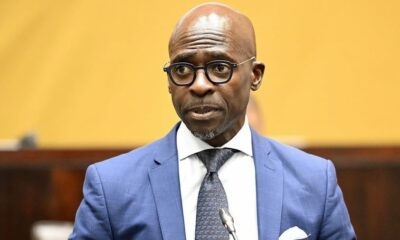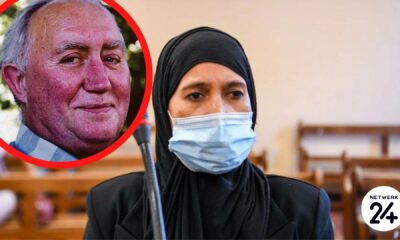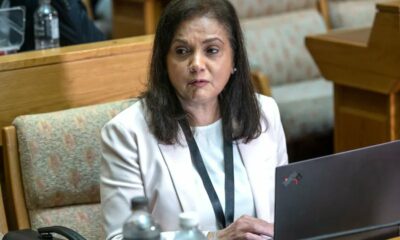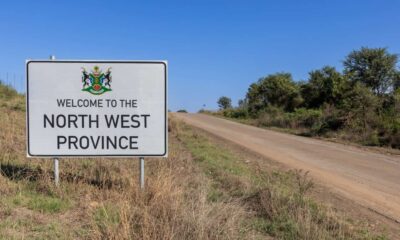News
‘Apartheid-Style Intimidation’: Cholota Extradition Ruled Unlawful in Major Blow to State

In a stunning twist in South Africa’s long-running asbestos corruption saga, the Bloemfontein High Court has declared Moroadi Cholota’s extradition from the United States unlawful—delivering a major blow to the National Prosecuting Authority (NPA) and sparking intense public scrutiny over the State’s tactics.
A Legal Battle Years in the Making
Moroadi Cholota, the former personal assistant to ex-Free State Premier Ace Magashule, has been at the centre of one of the country’s most controversial corruption cases: the R255 million asbestos roofing scandal.
Once a final-year political science student at the University of Maryland, USA, Cholota’s life changed dramatically in April 2024 when she was arrested by US authorities. Months later, she was extradited to South Africa and charged with fraud and corruption.
But from the start, her legal team insisted that her arrest was politically motivated and rooted in vengeance—because she refused to testify against Magashule.
Now, with the court siding with Cholota and declaring her extradition unlawful, her attorney, Piet Thabane, is speaking out.
“They Tried to Intimidate Her”
“They thought they could scare her into compliance,” Thabane told local media. “It was an apartheid-style tactic—abuse of power at its worst.”
Thabane insists the State’s case was never solid. “They didn’t present any credible facts in court. Even during the trial-within-a-trial, their witnesses had no involvement in the extradition. It was a disaster on their part.”
For Cholota, the ruling marks a moral victory—but her battle isn’t over.
“It’s been over a year of trauma, of humiliation,” Thabane said. “Her constitutional rights were trampled. She was degraded and treated as a pawn.”
A Student Caught in a Political Storm
What makes Cholota’s case so compelling—and controversial—is that she has never been formally implicated in the corruption itself by any of South Africa’s major investigative institutions.
In her affidavit, she pointed out that neither the State Capture Commission, the Public Protector, the Special Investigating Unit, nor the Auditor-General ever cited her in connection to the asbestos project. Yet, she was arrested, detained in a foreign country, and flown across the globe to face charges.
Social media has reacted with both outrage and sympathy, with many South Africans questioning how a student, not listed in any prior corruption reports, could be extradited and treated like a criminal.
The Political Undertones
While Cholota now walks free—for now—the bigger story remains: Was her prosecution less about justice and more about squeezing testimony out of her to use against Magashule?
Thabane says yes. “This wasn’t just about law. This was about leverage. And when she didn’t play ball, they made her an example.”
Indeed, observers see this ruling as a major dent in the NPA’s credibility, especially in a high-profile case that includes businessman Edwin Sodi and 16 others.
The original R255 million asbestos eradication project, announced by Magashule in 2014, was supposed to remove hazardous asbestos roofing from 300,000 homes in the Free State. According to the indictment, not a single home was fixed.
Yet despite the alleged failure of service delivery and irregular contracts awarded to Blackhead Consulting, the NPA’s focus on Cholota has raised eyebrows.
What’s Next?
The NPA has made it clear that it intends to appeal the court’s ruling. “We believe in our case and our team,” said NPA spokesperson Advocate Mthunzi Mhaga. “This decision does not affect the ongoing prosecution of the 17 other accused.”
Thabane, however, is confident: “Let them appeal. They’ll only embarrass themselves further.”
Whether or not Cholota returns to the US to finish her studies is still undecided. “It’s early days,” said Thabane. “Right now, she’s focused on reclaiming her life.”
A Moment of Reckoning?
This case may be more than a legal hiccup. For many South Africans, it serves as a painful reminder that the ghosts of State abuse still linger.
As one Twitter user bluntly put it:
“We fought for freedom, not for students to be dragged halfway across the world just to scare them into submission.”
In the court of public opinion, the State may have already lost. And for Moroadi Cholota, the ruling is not just a legal win it’s a small piece of justice in a fight that never should have been hers in the first place.
{Source: IOL}
Follow Joburg ETC on Facebook, Twitter , TikTok and Instagram
For more News in Johannesburg, visit joburgetc.com


























